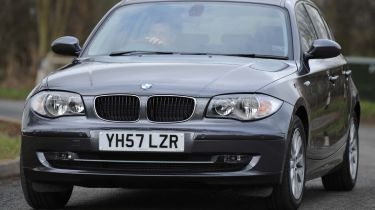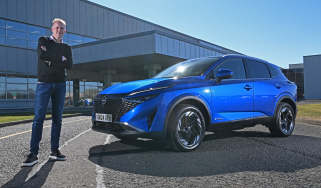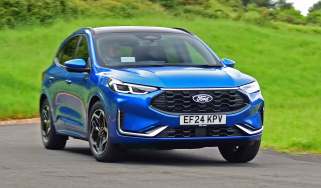BMW 118d SE
While eco updates on 1-Series go further, do they justify high price?
When the BMW 1-Series first arrived back in 2004, its shape polarised opinion. But whatever you think of the styling, there’s no doubt that the car has a premium look and feel.
It’s a similar story inside. The cabin is smartly laid out, and while some of the plastics on the centre console are not very tactile, the curved door handles and angular trim strip across the dash replicate some of the bold exterior lines.
Thanks to its rear-wheel-drive layout, the 1-Series can’t match the Golf when it comes to back seat room or boot space. But with a small, chunky steering wheel and an excellent driving position, you can’t fault the 118d’s comfort up front, and there’s a sporty feel to the cabin.
That’s not to say BMW has tried to hide the model’s eco credentials. As with the Bluemotion, you get a gearshift indicator which tells you when to change for optimum economy. Like the other Efficient Dynamics goodies, this is fitted across the 1-Series range – although it seems most appropriate here in the entry-level 118d.
The car is powered by a 143bhp 2.0-litre common-rail diesel that has a 39bhp advantage over the 1.9-litre unit in the Golf. It’s smoother and more refined, picks up eagerly around town and, despite long gearing, is remarkably flexible. What’s more, the engine ensured the BMW was quick against the clock – it was faster than the VW over every one of our test increments.
Used - available now

2023 Jaguar
I-PACE
23,410 milesAutomaticElectric
Cash £28,995
2014 Vauxhall
Corsa
61,620 milesManualPetrol1.2L
Cash £3,400
2015 Volkswagen
Golf GTI
94,900 milesManualPetrol2.0L
Cash £10,200
2018 Peugeot
3008
88,560 milesManualDiesel1.6L
Cash £9,000And yet the 118d’s official emissions and economy match the lighter and smaller-capacity Golf’s. This is all down to the fact that the Efficient Dynamics system goes further with its fuel-saving measures than VW’s Bluemotion package.
Engine stop-start and regenerative braking are fitted to the BMW – it’s a shame that, for now, VW hasn’t included this technology on the Golf Bluemotion.
The set-up works well on the 118d. When you come to a halt, select neutral and raise the clutch, the engine stops. Press the clutch to engage a gear, and the unit fires instantly. Once you get into the habit of selecting neutral at a standstill, the system is unobtrusive. Meanwhile, the regenerative braking reuses energy expelled when slowing to charge the battery, reducing the engine’s workload. Other clever features include flaps in the grille that close to boost cold-start times.
All this technology helped us average 49.6mpg in the 118d – 7.6mpg better than the Golf. And it’s all the more impressive when you consider the BMW’s superior pace and refinement.
Don’t worry that this new generation of ‘green’ cars is dull to drive, either – the 118d lays that to rest. The engine is mounted far back in the chassis, while the rear-wheel-drive layout gives the BMW crisp dynamics and agile handling.
Quicker steering, better body control, sharper brakes and a more rewarding gearchange mean the 118d is more alert than the Golf. But it’s not all good news. The ride is firm at low speeds, and the taut suspension fails to absorb bumps adequately. On rural roads the 118d hops and thumps over undulations that the Golf soaks up with ease. There’s also a firm edge and a hint of tyre noise on the motorway, although overall the BMW matches the VW for refinement at faster speeds.
In SE trim, the 118d has a similar kit list to the Golf Match, but it’s £4,085 more expensive, so you’d need to cover more than 210,000 miles before the BMW’s better economy earned that amount back. Still, you’re also paying a premium for the refinement, performance and handling advantages the 1-Series enjoys. The question is whether that’s enough for it to win this test.
Details
Price: £20,830
Model tested: BMW 118d SE
Chart position: 1
WHY: The Efficient Dynamics 118d combines impressive fuel economy with BMW’s usual strong handling.
Economy
City driving is where the BMW’s stop-start system really comes into its own. It helped the 1-Series pull out a 7.6mpg advantage over the Golf here, with its 49.6mpg figure.
Residuals
A retained value of 48.5 per cent ensures the 118d will still be worth £10,103 after three years. That’s not as much as the Golf, although both models are strong residually.
Servicing
BMW’s fixed-price servicing budgets your running costs in advance. You can choose service only or add maintenance, and the dealers came 11th in Driver Power.
Tax
The 118d proves owning a BMW doesn’t have to result in big bills. Road tax is £35 and business costs are low, although adding options drives up the bills.







